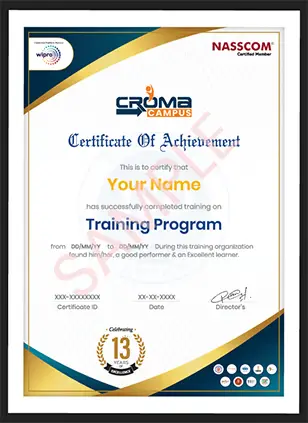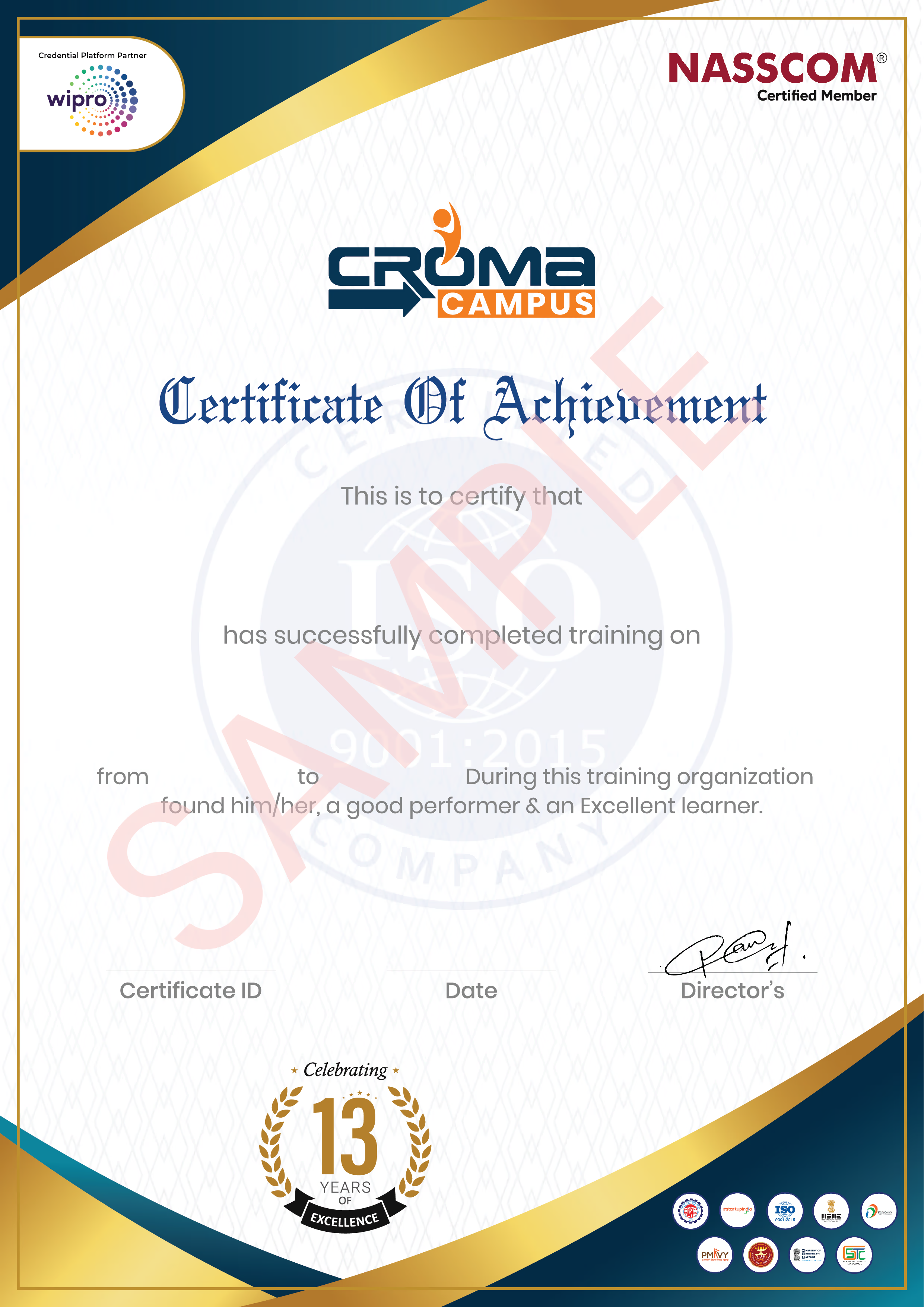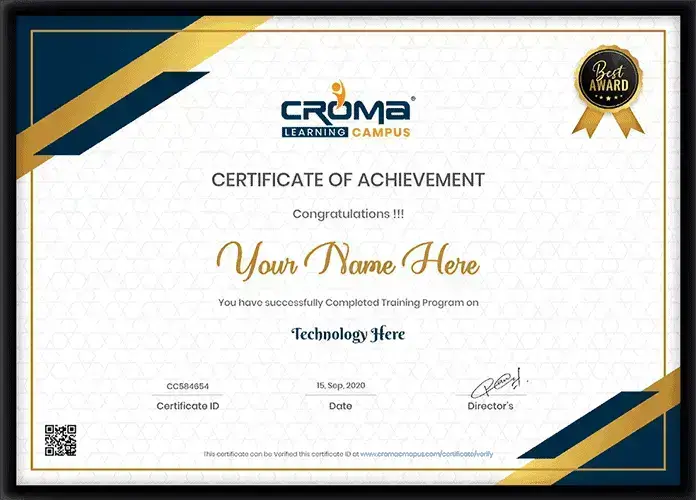- 2 Live Project
- Self-Paced/ Classroom
- Certification Pass Guaranteed
- Linux certification helps out in demonstrating a certain set of proficiency used for pointing the skills in a certain manner. The certification helps out in preparing IT (Information Technology) professionals for a new age of repute & challenges. Moreover, helps out to tackle the real-world environmental crisis. With the workloads of IT (Information Technology) systems, it is important to check out Linux Training Institute in Delhi.
- However, it has gone through the process of underlying architecture & sustainability crisis. Moreover, the concept grew out with higher reliability, affectability, and ethnicity. It is catching out the agenda due to the so much popularity of technical education going on in the world. If we take out the addition of these factors then Linux Training in Delhi getting a simultaneous boom.
- Linux Online Course Certifications enhance the ability of candidates to tackle new beginnings. Moreover, with the simultaneous Linux Training Institute getting momentum.
Learning out permissions, and utilities following technical aspects.
Controlling out the structures for further dissemination.
Handling out the shells in getting different projects.
Celebrating our new modules.
End-to-end support in consideration.
- After completing the Linux Training in Delhi, you can easily get out a salary in the range of RS 2 lakh to RS 5 lakh per annum. Moreover, with the continuous polishing of skills, it can easily get boosted with a range of multiple technologies.
- Microsoft Office comes out in the leading brands of maintaining technologies. Moreover, with the help of the Linux Training Institute in Delhi, you can easily increase your career perspectives going throughout the ongoing scenario. Go throughout the below-mentioned details:
One thing which is also important to consider is that there is no prerequisite for learning new technologies it has just to overcome new things.
The demand for Linux specialized professionals is not ending due to the ethnic popularity going towards the technological environment.
It is not important to lead out the technical jargon aspects for culminating out the new essence of growth trajectories.
If you want to lead out your career in Linux then there are some things necessary to consider before justifying it.
It also led to the controlling of activities denoted out for getting large aspects of ventures.
- Linux being the most popular technology in the inside domain just has to for the fulfillment of Linux Training in Delhi. It is generally for withholding out realms of technologies going throughout the ventures. Moreover, the capacity of managing multiple servers according to the need.
Professionals are responsible for maintaining the different classifications of DNS servers, CRON, etc. It has also gained numbered positions for multiple responsibilities.
Moreover, the major part of web content also gets related to the effectiveness of DNS servers. In the essence, these services can collaborate out with new ones.
These professionals also get responsible for the culmination of nuances in the proceedings of multiple technologies.
If we talk regarding this domain then it can also hamper new beginnings for technical adaption.
After completing the Linux course you can go for the job in multiple profiles like DevOps Engineer, Java Developer, Software Engineer, etc.
- Linux basically refers to the open-source operating system that can directly manage out software from the resources. If we talk in regard to the Operating Systems then it can get handled with the help of modernized applications going across the environment. Before enrolling in Linux Training Institute in Delhi it is important to check out the job responsibilities:
Patching, compiling, and troubleshooting resources.
Handling out new server connections for making technologically adaptable.
Implementing the changes in multiple environments.
Maintaining different configurations for open collaboration.
Leading the team from development to production.
- After completing our Linux Training in Delhi, you can get out hired by top companies like TCS, IBM, Infosys, Cvent, Tesla, etc. In addition to this, multiple small & middle size organizations can hire you.
- As your course from Linux Training institute in Delhi gets completed you get a 100% globally recognized certificate that will help out you in getting numerous job opportunities. Additionally, available in digital format.
- Related Courses to Linux Training in Delhi
Why should we learn Linux?
By registering here, I agree to Croma Campus Terms & Conditions and Privacy Policy
 Course Duration
Course Duration
40 Hrs.Flexible Batches For You
26-Apr-2025*
- Weekend
- SAT - SUN
- Mor | Aft | Eve - Slot
28-Apr-2025*
- Weekday
- MON - FRI
- Mor | Aft | Eve - Slot
23-Apr-2025*
- Weekday
- MON - FRI
- Mor | Aft | Eve - Slot
26-Apr-2025*
- Weekend
- SAT - SUN
- Mor | Aft | Eve - Slot
28-Apr-2025*
- Weekday
- MON - FRI
- Mor | Aft | Eve - Slot
23-Apr-2025*
- Weekday
- MON - FRI
- Mor | Aft | Eve - Slot
Want To Know More About
This Course
Program fees are indicative only* Know more
Timings Doesn't Suit You ?
We can set up a batch at your convenient time.
Program Core Credentials
Trainer Profiles
Industry Experts
Trained Students
10000+
Success Ratio
100%
Corporate Training
For India & Abroad
Job Assistance
100%
BATCH TIMING
As per your requirementFOR QUERIES, FEEDBACK OR ASSISTANCE
Contact Croma Campus Learner Support
Best of support with us
Linux Certification Training Programs
Linux Certification TrainingPrograms
- Red Hat Certified Engineer is an important accreditation that validates your skills concerning building and developing an effective technical team. In a way, it verifies your skills enough to work with your Red Hat products.
Red Hat System Administration I
Red Hat System Administration II
Red Hat Linux Automation with Ansible
- Get started with Red Hat Enterprise Linux
Describe and define open source, Linux distributions, and Red Hat Enter prise Linux.
- Access the command line
Log into a Linux system and run simple commands using the shell.
- Manage files from the command line
Copy, move, create, delete, and organize files while working from the bash shell.
- Get help in Red Hat Enterprise Linux
Resolve problems by using local help systems.
- Create, view, and edit text files
Manage text files from command output or in a text editor.
- Manage local users and groups
Create, manage, and delete local users and groups, as well as administer local password policies.
- Control access to files
Set Linux file system permissions on files and interpret the security effects
of different permission settings.
- Monitor and manage Linux processes
Evaluate and control processes running on a Red Hat Enterprise Linux system.
- Control services and daemons
Control and monitor network services and system daemons using systemd.
- Configure and secure SSH
Configure secure command line service on remote systems, using OpenSSH.
- Analyze and store logs
Locate and accurately interpret logs of system events for troubleshooting purposes.
- Manage networking
Configure network interfaces and settings on Red Hat Enterprise Linux servers.
- Archive and transfer files
- Install and update software
Download, install, update, and manage software packages from Red Hat and yum package repositories.
- Access Linux files systems
Access, inspect, and use existing file systems on storage attached to a Linux server.
- Analyze servers and get support
Investigate and resolve issues in the web-based management interface, getting support from Red Hat to help solve problems.
- Comprehensive review
- Review the content covered in this course by completing hands-on exercises.
- Improve command line productivity
Run commands more efficiently by using advanced features of the Bash shell, shell scripts, and various utilities provided by Red Hat Enterprise Linux.
- Schedule future tasks
Schedule commands to run in the future, either one time or on a repeating schedule.
- Tune system performance
Improve system performance by setting tuning parameters and adjusting scheduling priority of processes.
- Control access to files with ACLs
Interpret and set access control lists (ACLs) on files to handle situations requiring complex user and group access permissions.
- Manage SE Linux security
Protect and manage the security of a server by using SE Linux.
- Manage basic storage
Create and manage storage devices, partitions, file systems, and swap spaces from the command line.
- Manage logical volumes
Create and manage logical volumes containing file systems and swap spaces from the command line.
- Implement advanced storage features
Manage storage using the Straits local storage management system and use VDO volumes to optimize storage space in use.
- Access network-attached storage
Use the NFS protocol to administer network-attached storage.
- Control the boot process
Manage the boot process to control services offered and to troubleshoot and repair problems.
- Manage network security
Control network connections to services using the system firewall and SE Linux rules.
- Install Red Hat Enterprise Linux
Install Red Hat Enterprise Linux on servers and virtual machines.
- Run Containers
Obtain, run, and manage simple, lightweight services as containers on a single Red Hat Enterprise Linux server.
- Introduce Ansible
Describe Ansible concepts and install Red Hat Ansible Engine.
- Deploy Ansible
Configure Ansible to manage hosts and run ad hoc Ansible commands.
- Implement playbooks
Write a simple Ansible Playbook and run it to automate tasks on multiple managed hosts.
- Manage variables and facts
Write playbooks that use variables to simplify management of the play book and facts to reference information about managed hosts.
- Implement task control
Manage task control, handlers, and task errors in Ansible Playbooks.
- Deploy files to managed hosts
Deploy, manage, and adjust files on hosts managed by Ansible.
- Manage large projects
Write playbooks that are optimized for larger, more complex projects.
- Simplify playbooks with roles
Use Ansible roles to develop playbooks more quickly and to reuse Ansible code.
- Troubleshoot Ansible
Troubleshoot playbooks and managed hosts.
- Automate Linux administration tasks
Automate common Linux system administration tasks with Ansible.
- 2 Live Project
- Self-Paced/ Classroom
- Certification Pass Guaranteed
- Red Hat Certified Engineer is an important accreditation that validates your skills concerning building and developing an effective technical team. In a way, it verifies your skills enough to work with your Red Hat products.
Red Hat System Administration I
Red Hat System Administration II
- Get started with Red Hat Enterprise Linux
Describe and define open source, Linux distributions, and Red Hat Enter prise Linux.
- Access the command line
Log into a Linux system and run simple commands using the shell.
- Manage files from the command line
Copy, move, create, delete, and organize files while working from the bash shell.
- Get help in Red Hat Enterprise Linux
Resolve problems by using local help systems.
- Create, view, and edit text files
Manage text files from command output or in a text editor.
- Manage local users and groups
Create, manage, and delete local users and groups, as well as administer local password policies.
- Control access to files
Set Linux file system permissions on files and interpret the security effects of different permission settings.
- Monitor and manage Linux processes
Evaluate and control processes running on a Red Hat Enterprise Linux system.
- Control services and daemons
Control and monitor network services and system daemons using systemd.
- Configure and secure SSH
Configure secure command line service on remote systems, using OpenSSH.
- Analyze and store logs
Locate and accurately interpret logs of system events for troubleshooting purposes.
- Manage networking
Configure network interfaces and settings on Red Hat Enterprise Linux servers.
- Archive and transfer files
Install and update software
Download, install, update, and manage software packages from Red Hat and yum package repositories.
- Access Linux files systems
Access, inspect, and use existing file systems on storage attached to a Linux server.
- Analyze servers and get support
Investigate and resolve issues in the web-based management interface, getting support from Red Hat to help solve problems.
- Comprehensive review
- Review the content covered in this course by completing hands-on exercises.
- Improve command line productivity
Run commands more efficiently by using advanced features of the Bash shell, shell scripts, and various utilities provided by Red Hat Enterprise Linux.
- Schedule future tasks
Schedule commands to run in the future, either one time or on a repeating schedule.
- Tune system performance
Improve system performance by setting tuning parameters and adjusting scheduling priority of processes.
- Control access to files with ACLs
Interpret and set access control lists (ACLs) on files to handle situations requiring complex user and group access permissions.
- Manage SE Linux security
Protect and manage the security of a server by using SE Linux.
- Manage basic storage
Create and manage storage devices, partitions, file systems, and swap spaces from the command line.
- Manage logical volumes
Create and manage logical volumes containing file systems and swap spaces from the command line.
- Implement advanced storage features
Manage storage using the Straits local storage management system and use VDO volumes to optimize storage space in use.
- Access network-attached storage
Use the NFS protocol to administer network-attached storage.
- Control the boot process
Manage the boot process to control services offered and to troubleshoot and repair problems.
- Manage network security
Control network connections to services using the system firewall and SE Linux rules.
- Install Red Hat Enterprise Linux
Install Red Hat Enterprise Linux on servers and virtual machines.
- Run Containers
Obtain, run, and manage simple, lightweight services as containers on a single Red Hat Enterprise Linux server.
Mock Interviews
Prepare & Practice for real-life job interviews by joining the Mock Interviews drive at Croma Campus and learn to perform with confidence with our expert team.Not sure of Interview environments? Don’t worry, our team will familiarize you and help you in giving your best shot even under heavy pressures.Our Mock Interviews are conducted by trailblazing industry-experts having years of experience and they will surely help you to improve your chances of getting hired in real.How Croma Campus Placement Process Works?
Phone (For Voice Call):
+91-971 152 6942WhatsApp (For Call & Chat):
+91-9711526942Projects
Batch Request
SELF ASSESSMENT
Learn, Grow & Test your skill with Online Assessment Exam to
achieve your Certification Goals

FAQ's
To enroll in Linux Training in Delhi, the candidate must possess a fundamental understanding of the Linux framework, which is generally taught at the beginning of the course. Besides, knowledge about various concepts will prove to be extremely beneficial for all aspiring applicants.
The exact duration of the course varies with different course providers. However, on average, the course can be completed within 5 -7 weeks of enrolling. They also offer the option of online coaching on days when the students are unable to attend the discourses.
Linux training course is best suited to anyone who has an inherent interest in this domain.
The average pay of a trained Linux Professional is approximately INR 3- 4 lakhs per annum. For professionals who have more than 3 years of experience, the pay can also go up to INR 6 lakhs per annum.
At Croma Campus, you can come across a verified Linux Training Institute in Delhi. You can easily filter your search by choosing your preferred mode of training, and your locality. Once you fill-up the form above, our authorities will get back to you to talk over your detailed training needs and help you in choosing the right institute.

- - Build an Impressive Resume
- - Get Tips from Trainer to Clear Interviews
- - Attend Mock-Up Interviews with Experts
- - Get Interviews & Get Hired
If yes, Register today and get impeccable Learning Solutions!.

Training Features
Instructor-led Sessions
The most traditional way to learn with increased visibility,monitoring and control over learners with ease to learn at any time from internet-connected devices.
Real-life Case Studies
Case studies based on top industry frameworks help you to relate your learning with real-time based industry solutions.
Assignment
Adding the scope of improvement and fostering the analytical abilities and skills through the perfect piece of academic work.
Lifetime Access
Get Unlimited access of the course throughout the life providing the freedom to learn at your own pace.
24 x 7 Expert Support
With no limits to learn and in-depth vision from all-time available support to resolve all your queries related to the course.
Certification
Each certification associated with the program is affiliated with the top universities providing edge to gain epitome in the course.
Showcase your Course Completion Certificate to Recruiters
-
Training Certificate is Govern By 12 Global Associations.
-
Training Certificate is Powered by “Wipro DICE ID”
-
Training Certificate is Powered by "Verifiable Skill Credentials"












.webp)


















 Master in Cloud Computing Training
Master in Cloud Computing Training